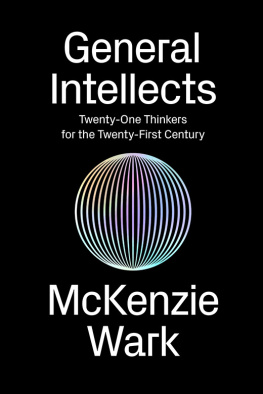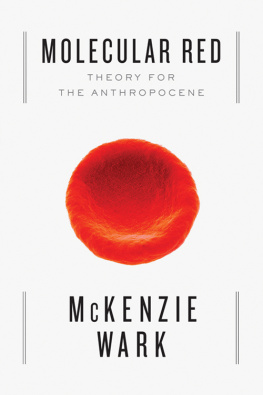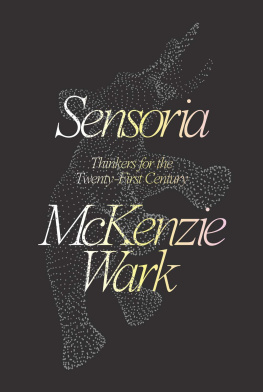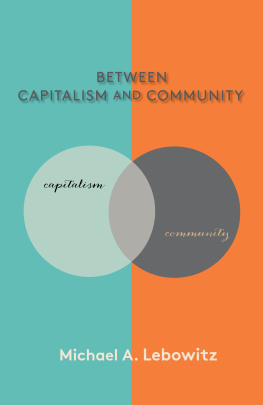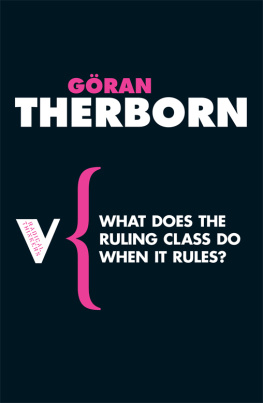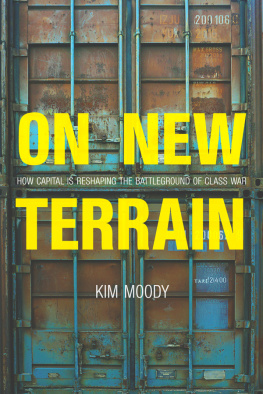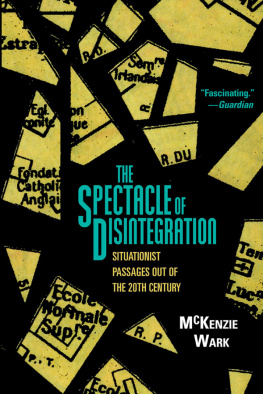Contents

CAPITAL
IS DEAD
CAPITAL
IS DEAD
MCKENZIE WARK

First published by Verso 2019
McKenzie Wark 2019
All rights reserved
The moral rights of the author have been asserted
1 3 5 7 9 10 8 6 4 2
Verso
UK: 6 Meard Street, London W1F 0EG
US: 20 Jay Street, Suite 1010, Brooklyn, NY 11201
versobooks.com
Verso is the imprint of New Left Books
ISBN-13: 978-1-78873-530-8
ISBN-13: 978-1-78873-531-5 (UK EBK)
ISBN-13: 978-1-78873-532-2 (US EBK)
British Library Cataloguing in Publication Data
A catalogue record for this book is available from the British Library
Library of Congress Cataloging-in-Publication Data
Names: Wark, McKenzie, 1961- author.
Title: Capital is dead / McKenzie Wark.
Description: London ; New York : Verso, 2019. | Includes bibliographical references.
Identifiers: LCCN 2018059614| ISBN 9781788735308 (hardcover) | ISBN 9781788735315 (United Kingdom ebook)
Subjects: LCSH: Capitalism.
Classification: LCC HB501 .W4395 2019 | DDC 332/.041dc23
LC record available at https://lccn.loc.gov/2018059614
Typeset in Fournier by MJ & N Gavan, Truro, Cornwall
Printed in the UK by CPI Mackays, UK
Contents
Post-capitalists general strategy right now
is to render language (all that which signifies)
abstract therefore easily manipulable.
Kathy Acker
Which punk rock goddess are you? Im Kim Gordon. Or I was. Not happy with that answer, I took the online quiz a few more times, until I got Patti Smith. I dont know what company made that quiz, but I agreed to give them access to a whole bunch of information in exchange for the privilege of playing it, in order to learn what I already know, that Im more of a Patti Smith type than a Kim Gordon type.
The quiz held my attention for long enough to escape boredom, and it gave me something to post on social media, presumably to snag other peoples attention. Some people get rather freaked out about algorithms that seem to know so much about us, although I always thought of privacy as a bourgeois concept. What is dystopian here may be less the sharing of information than the asymmetry of the sharing.
If you are getting your media for free, this usually means that you are the product. If the information is not being sold to you, then it is you who are being sold. This is something that those of us in media studies have been teaching our students and telling the public since the broadcast era. In a time in which the quantity of information was rising and its cost plummeting, what was still rare and valuable was (and is) your attention.
In the broadcast era it was hard to even know whose attention a show gathered and whether any particular advertising worked. The ad industry guru David Ogilvy reported one of his clients claiming that half of his advertising worked and half of it failed, but he did not know which half was which. A good deal of snake oil still goes into persuading ad buyers that advertisers have magical means of persuasion that will galvanize peoples attention, lodge the brand in memory, and mobilize peoples desire toward actually buying the product orsame thing reallyvoting for the candidate.
The evil genius of the postbroadcast-era media is that it not only holds our attention, it also records it. A lot more information can be extracted as to who we are, what we like, and which punk rock goddess we want to be. A lot of media consumers end up being quite shocked at just how much information about themselves they are giving away, and for free.
The old culture industries had figured out how to commodify leisure.
Not just our labor, not just our leisuresomething else is being commodified here: our sociability, our common and ordinary life together, what you might even call our communism. Sure, its not a utopian version of communism. Its a very banal and everyday one, its our love of sharing our thoughts and feelings with each other and having connections to other people. But still, most people seem rather alarmed that their desire to share and be with each other, to reach out to friends, to pass on cat pictures, even their desire to have ferocious arguments with strangers, is making someone else very, very rich.
That people who use the Internet are tracked and monitored and turned into information is not even the half of it. If you think your social media is spying on you, just imagine what kind of information your bank has on you. Theres a whole political economy that runs on asymmetries of information as a form of control.
These days, not just everyone but everything is tracked and monitored and turned into information. If you order a package from an online website, you can follow the delivery of the item through its stages on its way to you. Its a consumer grade version of tracking the movement of everything: animal, mineral, and vegetable. For these purposes, even though you think you fall in the animal category, you are also being tracked as if you were a rock. The mineral sandwich in your pocket, your cellphone, is generating information about all of its movements.
Out of all of this information about the habits and movements of people and things, you can generate predictions about future movements. Well, you cant do that: while you produce this information, it all ends up privately owned by some information-centric company. You make the information, but like some kind of info-prole, you dont own the information you produce or the means of realizing its value. You dont get to benefit from its predictive power, although you will likely suffer the downside when those predictions prove spurious.
Because this vast, wonky information commons that we are all producing is privatized, it can be very hard to know how accurate or useful any of that information actually is. However, its a conversation frequently sidetracked into the demand for a fairer algorithm, as if there could still be a neutral third party above our differences, from which to pray for not much more than an equal right to be exploited by asymmetries of information. These discriminatory aspects of the information political economy need to be criticized and struggled over, but lets not lose sight of the bigger picture. That bigger picture is the information political economy as a whole.
Before focusing on what the corporations who own and control information are doing to us, lets pause to look at the peculiarities of the information itself.
Information is now such a pervasive organizing force that it has seeped into our worldview. What we think of as technology these days very often means technologies that instrumentalize information. These are specific kinds of apparatus that gather, sort, manage, and process information so that it can then be used to control other things in the world. Information technology is a sort of meta-technology, designed to observe, measure, record, control, and predict what things, people, or indeed other information can or will or should do.
These technologies made information very, very cheap and very, very abundant. They gave rise to a strange kind of political economy, one based not only on a scarcity of things but also on an excess of information. This generated quite novel kinds of problems for those who had (or aspired to) power: how to maintain forms of class inequality, oppression, domination, and exploitation, based on something that in principle is now ridiculously abundant.
My proposition in this book is that resolving this contradiction called into being a new mode of production. This is not capitalism anymore; it is something worse. The dominant ruling class of our time no longer maintains its rule through the ownership of the means of production as capitalists do. Nor through the ownership of land as landlords do. The dominant ruling class of our time owns and controls information.


